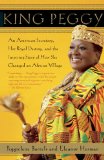Summary | Excerpt | Reading Guide | Reviews | Beyond the book | Read-Alikes | Genres & Themes | Author Bio

A Memoir
by Wangari MaathaiHugely charismatic, humble, and possessed of preternatural luminosity of spirit, Wangari Maathai, recounts her extraordinary life as a political activist, feminist, and environmentalist in Kenya.
Hugely charismatic, humble, and possessed of preternatural luminosity of spirit, Wangari Maathai, the winner of the 2004 Nobel Peace Prize and a single mother of three, recounts her extraordinary life as a political activist, feminist, and environmentalist in Kenya.
Born in a rural village in 1940, Wangari Maathai was already an iconoclast as a child, determined to get an education even though most girls were uneducated. We see her studying with Catholic missionaries, earning bachelor’s and master’s degrees in the United States, and becoming the first woman both to earn a PhD in East and Central Africa and to head a university department in Kenya. We witness her numerous run-ins with the brutal Moi government. She makes clear the political and personal reasons that compelled her, in 1977, to establish the Green Belt Movement, which spread from Kenya across Africa and which helps restore indigenous forests while assisting rural women by paying them to plant trees in their villages. We see how Maathai’s extraordinary courage and determination helped transform Kenya’s government into the democracy in which she now serves as assistant minister for the environment and as a member of Parliament. And we are with her as she accepts the Nobel Peace Prize, awarded in recognition of her “contribution to sustainable development, human rights, and peace.”
In Unbowed, Wangari Maathai offers an inspiring message of hope and prosperity through self-sufficiency.
Unbowed is a powerful tale of one woman's life. Maathai's simple, straightforward style is entirely in character and appropriate with the story she has to tell...continued
Full Review
(764 words)
This review is available to non-members for a limited time. For full access,
become a member today.
(Reviewed by BookBrowse Review Team).
Kenya is located on the East Coast of Africa, bordered by the Indian Ocean, Tanzania, Uganda, Sudan, Ethiopia and Somalia (map). The Portuguese explorer Vasco da Gama was the first European on record to visit the area in 1498. Portuguese rule officially began in 1505, bringing the Portuguese a useful revenue source from tribute payments, but also strategic control of the Indian Ocean allowing them to extract high tariffs on items transported by sea.
By the 17th century, Portuguese influence in the area was on the wane due to British, Dutch and Arab incursions. Omani Arabs colonized the coastal areas in the 19th century, even moving their capital to Zanzibar (an island off the coast of Tanzania) in 1839. Their control of the East African ...
This "beyond the book" feature is available to non-members for a limited time. Join today for full access.

If you liked Unbowed, try these:

by Paula McLain
Published 2016
The extraordinary adventures of a woman before her time, the exhilaration of freedom and its cost, and the tenacity of the human spirit.

by Peggielene Bartels, Eleanor Herman
Published 2013
The charming real-life fairy tale of an American secretary who discovers she has been chosen king of an impoverished fishing village on the west coast of Africa.
Poetry is like fish: if it's fresh, it's good; if it's stale, it's bad; and if you're not certain, try it on the ...
Click Here to find out who said this, as well as discovering other famous literary quotes!